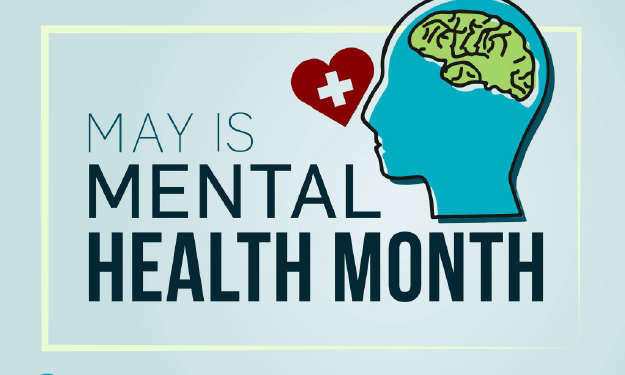Mental Health Tips for Veterinary Professionals

May is Mental Health Month and we feel strongly about recognizing the mental health crisis in our veterinary industry.
For our veterinary teams & community, remember: the bravest thing you can do is ask for help. Set boundaries and take care of yourself. Support each other, and utilize mental health resources (we have an Employee Assistance Program!) For our clients & pet owners: consider sending a thank you this month to a veterinary team who has impacted your life, whether it be your regular vet who cares for your pet every year, an ER who saved their life, or a specialty team who held your hand every step of the way. Every kind note or gesture makes a difference.
Here are 5 tips from Mental Health America for taking care of your mental wellbeing:
Tip #1: Maintain Good Food Choices, Nutrition, & Exercise

Your gut is considered your “second brain” and eating nutritious foods can keep your brain healthy & protected. Staying active, even just for 1 hour a week, has been found to prevent symptoms of depression.
Tip from a Licensed Veterinary Social Worker: “Maintaining a healthy diet can be challenging when you work in a fast-paced environment with long hours. If you’re looking to make healthy changes, start small! Try packing healthy snacks for when you get hungry throughout the day. They will keep your energy up and will help discourage you from reaching for those less healthy options that may slow you down throughout the day.”
Tip #2: Catch Some Z’s

Mental health hugely depends on how rested you are. Many people are affected by sleep problems which can contribute to health risks. Good habits, routines, and consistency are key!
Tip from a Licensed Veterinary Social Worker: “Maintaining healthy sleep habits are crucial for our wellbeing. Try ‘unplugging’ from your devices at least 30 minutes before you go to bed to help you fall asleep faster. To stay asleep, avoid consuming caffeine or alcohol before bed. If you don’t have enough time to get a full night’s rest, start by adding 30 minutes of extra sleep time to your schedule; it may seem small, but it can have a big impact on your energy and wellbeing.”
Tip #3: How to Cope With Your Stress

We all feel stress and usually the body can quickly return to functioning in a normal, healthy way. But when stress becomes chronic, it can affect your mental and physical health. Coping with stress may look different for each individual person, but there are realistic ways to do it!
Tip from a Licensed Veterinary Social Worker: “Coping with stress in healthy ways can help build resiliency. To cope with stress during a busy workday try a quick breathing/relaxation exercise, go for a short walk, and don’t forget to take your lunch break! It’s important to take your breaks to recharge throughout the day.”
Tip #4: Identify Coping Skills That Work For YOU

Everyone goes through periods of hardship and stress, and it’s important to take care of yourself. You should have tools and activities ready for you when times get tough, and that may take a few tries to find what works best for you.
Tip from a Licensed Veterinary Social Worker: “Not everyone employs the same coping skills; what works for one person might not work for you. It’s important to try different techniques and self-care practices to figure out what works best for YOU. This may take a lot of trial and error but that’s okay, it’s how we learn what works for us.”
Tip #5: Build Your Support System

Humans are social by nature. Loneliness can cause the same amount of damage to your lifespan as smoking or obesity! Having a strong social support system can prevent mental health illness and improve recovery from a mental health condition.
Tip from a Licensed Veterinary Social Worker: “It’s important to have a support system both inside and outside of work. Connect with colleagues you trust; chances are they may have similar workplace stressors. Make sure you also connect with friends, family, or a partner who can help support you outside of work. Mental health professionals are another important part of a healthy support system, and they can help you develop coping skills and self-care strategies to maintain a healthy mental wellbeing and lifestyle.”
If You’re Struggling
Ask for help. Set boundaries and take care of yourself. Support each other, and utilize mental health resources (to our Ethos teams – please utilize our Employee Assistance Program for free counseling and visits with a mental health practitioner.) You may never know the impact of a kind word, but you could be building someone up when they need it most.
If you, a loved one, or a coworker are thinking about suicide or would like emotional support, text or call the 24/7 Suicide and Crisis Lifeline at 988, or text TALK to 741741.